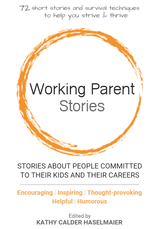|
Inspired by a New York Times article by Jessica Bennett What does your child's failure, large or small, imply about you? Many parents, those who pursue careers and those who don't, seem to fear that a child's failure will imply that they aren't parenting well. Think about that; some people think that a child's failure isn't healthy and even go to unusual extremes to help their children avoid failing. This topic caught our attention after reading an article in the New York Times called "On Campus, Failure Is on the Syllabus". It turns out that some students are so unfamiliar with failure that some colleges are offering courses to teach them how to do it. As a working parent, this topic caught me off-guard because failure was an integral part of daily life around our house. While I always produced clean clothes for everyone, they weren't always dry. Homework and lunches were occasionally forgotten. Planes were missed; twice. Test scores weren't always worthy of display on the refrigerator. Vacation activities sometimes proved to be ... not so fun. And managers didn't always heap on the praise. And yet ... we survived. Sometimes we even succeeded. Each of us learned, at least theoretically, that when something doesn't turn out the way you want, you keep on going, try harder next time, and often need to change your behavior to avoid experiencing even more failure in the future. Failure isn't a showstopper, but it is often a signal that change is needed. Many years ago a friend advised, "Let your kids fail on the little stuff when they are little so that they're not learning to deal with failure for the first time when they are older and the stakes are much higher." We took the advice to heart, but have to admit, even today, that watching anyone you care about fail is not easy. And it's not fun. Sometimes we failed when it came to teaching failure. "Good parents" let their kids fail; they don't swoop in, solve problems that children could solve for themselves, and then declare themselves the heroes in their family stories. Instead, they encourage children to resolve their own failures, and they allow their children to feel the satisfaction and experience the increased self-confidence that those failure experiences produce. They let their children become the heroes of their own stories, and they teach them that struggle can be valuable. They understand that parents should attempt to keep their children safe, but that most failures don't compromise safety. For all parents, and especially working parents, these realizations can be freeing. When we make room for failure, we spend less time doing and more time watching, supporting, and encouraging. As Retired USAF Colonel Gregory H. Johnson said at Michigan Tech's spring commencement ceremony recently, "Failure's not only an option, it's a requirement for succeeding in life." Related story:
0 Comments
|
The StoriesArchives
March 2022
Categories
All
|
Photos from barnimages.com, marcoverch, truewonder, donnierayjones, marcoverch, shixart1985, Gustavo Devito, edenpictures, nan palmero, quapan, The Pumpkin Theory, bark, opassande, Semtrio, Ivan Radic (CC BY 2.0), verchmarco (CC BY 2.0), Didriks, shawnzrossi, shixart1985 (CC BY 2.0), madprime, marksmorton, CT Arzneimittel GmbH, NwongPR, franchiseopportunitiesphotos, anotherlunch.com, jdlasica, wuestenigel, Frinthy, romanboed, Doris Tichelaar, quinn.anya, A_Peach, VisitLakeland, MEDION Pressestelle, Darren Wilkinson, bratislavskysamospravnykraj, Anthony Quintano, Danielle Scott, pockethifi, Bridgette Rehg, Martin Pettitt, PersonalCreations.com, wuestenigel, Thad Zajdowicz, archer10 (Dennis) 139M Views, Infomastern, beltz6, The National Guard, futurestreet, daveynin, OIST (Okinawa Institute of Science and Technology), Rinet IT, shixart1985, mikecogh, JeepersMedia, Ryan Polei | www.ryanpolei.com, Jake.Christopher., aleksandrajovovich, thepeachpeddler, wwward0, flossyflotsam, Got Credit, Senado Federal, Corvair Owner, lookcatalog, moodboardphotography, dejankrsmanovic, Carine fel, ElleFlorio, {Guerrilla Futures | Jason Tester}, greg westfall., Arlington County, mariaronnaluna, quinn.anya, wuestenigel, Tayloright, insatiablemunch, MrJamesBaker, Scorius, Alan Light, Monkey Mash Button, www.audio-luci-store.it, wohlford, Vivian Chen [陳培雯], okchomeseller, BoldContent, Ivan Radic, verchmarco, donnierayjones, Czar Hey, US Department of Education, Andrew Milligan Sumo, Michel Curi, anotherlunch.com, ProFlowers.com, Cultural viewpoints from around the world, alubavin, yourbestdigs, Rod Waddington, Tayloright, Wonder woman0731, yourbestdigs, donald judge, Thomas Leth-Olsen, Infinity Studio, shixart1985, wuestenigel, francesbean, Roger Blackwell, MrJamesBaker, Luca Nebuloni, MFer Photography, erinw519, boellstiftung, North Carolina National Guard, A m o r e Caterina, MrJamesBaker, bellaellaboutique, Free For Commercial Use (FFC), Prayitno / Thank you for (12 millions +) view, wuestenigel, Matt From London, MadFishDigital, Kompentenzzentrum Frau und Beruf, mikecogh, CreditDebitPro, marciadotcom, Mr.Sai, _steffen



 RSS Feed
RSS Feed